- Home
- Artists
-
-
Asia Art Collective
Asia Art Collective represents First and Second generation Singaporean artists with strong artistic skills and distinct personal styles. Artworks are also professionally curated by Asia Art Collective consultants based on technique and style.
-
- Aaron Gan 颜明正Aaron Gan (b.1979) is an outstanding, young watercolour artist, representative of a young generation of artists in Singapore. Gan breaks away from the conventional practice of watercolour painting in Singapore, by his choice of subject matter and his technique – influenced by Chinese philosophy and the composition of Chinese painting. Gan’s watercolour painting is carefree and vigorous, breathing spontaneity, life and imagination to familiar subjects and landscapes.
- Adi Gunawan
- Andre Tan
- Ang Ah Tee 洪亚弟Born in 1943 in Singapore, Ang Ah Tee is a second-generation Singaporean artist and one of the nation’s most acclaimed and celebrated cultural treasures. He is a watercolour, oil and acrylic painter, best known for his vivid landscape paintings inspired by extensive travels around the world and his compelling abstract works. He studied in the Nanyang Academy of Fine Arts, and in the three years he spent at the academy, he was tutored by Singapore art pioneers. Among his teachers, he counts Georgette Chen and Cheong Soo Pieng—both pioneering Nanyang style artists—as having the most significant influence on his art. Chen would inculcate in Ang the importance of building a strong foundation in his artistic studies and practice and Cheong’s creativity was a source of constant inspiration for Ang. Through his career, Ang exhibited his art at numerous solo and group exhibitions both in Singapore and internationally. In 1974, he won the Open Art Competition organised by the Port of Singapore Authority and participated in a group exhibition in the Singapore Chinese Chamber of Commerce and Industry. In 2009. Ang received the Cultural Medallion for his contributions to visual arts in Singapore. The veteran artist has held 11 solo exhibitions,…
- Anthony Chua Say Hua 蔡世华Anthony Chua Say Hua, who was born in Singapore in 1966, has been immersed in different cultures through his journey as an artist. He received a Diploma in Fine Arts from Nanyang Academy of Fine Arts in 1989-92, and continued his art study at the Royal Melbourne Institute of Technology in Australia (1993-94) and Goldsmiths College in London (1996-97). In addition, he completed an art fellowship at Vermont Studio Center in Johnson, USA. As he masterfully mixes the best of the two cultures, his distinctive contemporary Chinese ink paintings are informed by Western Modernist aesthetics while employing the logic and philosophy of traditional Chinese ink painting technique. Chua Say Hua is a versatile artist who is adventurous in his expression in art, he has dabbled with the effects of smearing, rubbing, and layering ink to build on the unique intricacies of ink wash on rice paper, in addition to playing with diverse compositional themes. In his paintings, the artist is recognized for using a variety of brushes and unusual instruments such as peacock feathers and squeeze bottles. He has won various awards in competitions over the years. In 2001, he got the National Arts Council’s Young Artist Award, and in…
- Aw Tee Hong 欢世鸿
- Boo Sze Yang 巫思远Boo Sze Yang received his Bachelor of Fine Arts from Nanyang Academy of Fine Arts in 1991 and his Postgraduate Diploma in Fine Art from the University of Reading in the United Kingdom in 1995. He also earned a Master of Arts degree from the University of the Arts, London’s Chelsea College of Art & Design in 2004. He was awarded the Freeman Foundation’s Asian Artist Fellowship Award for residency at the Vermont Studio Center in the United States in 2010/2011. He won the Juror’s Choice Award for the Philip Morris Singapore-ASEAN Art Award in 2003, and the Platinum Award for the UOB Painting of the Year Competition in 2009. He is featured in the Thames & Hudson publication 100 Painters of Tomorrow in 2014. Boo Sze Yang works with unconventional subjects, such as domestic objects, depiction of transport crash-scenes and interiors of cathedrals and shopping malls. His works feature scenes as a metaphor for human conditions, such as his ongoing Mall series which is a study of space as a concept and a symbol. Through his eclectic brushworks and subdued colours, he creates an ambiance of light and space, inviting those who saw them to contemplate its meanings. The…
- Chaichana Luetrakun
- Chan Shi Jin 陈士仅
- Chen Chong Swee 陈宗瑞
- Chen Wen Hsi 陈文希
- Chieu Shuey Fook 丘瑞福
- Cheong Soo Pieng 钟泗滨
- Choo Keng Kwang 朱庆光
- Choy Weng Yang 蔡荣恩
- Chua Ek Kay 蔡逸溪
- Chua Mia Tee 蔡名智
- Coplu
- Diana Francis
- Eng Siak Loy 翁锡礼Eng Siak Loy was born in China and moved to Singapore with his family when he was eight years old. His artistic journey began from the now-defunct Singapore Art Academy in 1960. After his graduation, he moved on as a graphic designer for the former Radio and Television Singapore before transferring to the Ministry of Education as a senior graphic artist. He worked at the Housing and Development Board in 1972, then moving on to the National Parks Board’s graphic and art department until his retirement in 2009. Outside of his day job, Eng Siak Loy also designed collaterals used to inform the public about the government’s policies and practices as well as stamps, coins, and currency notes. His stamp designs for the Economic Commission for Asia and the Far East’s (ECAFE) 25th Plenary Session became the first of more than 50 issues he has developed. In 1999, he also designed the whole Portrait Series of Singapore currency notes, which are still in circulation today and feature Singapore’s first Head of State, Yusof Ishak. In 2007, Eng Siak Loy was named Designer of the Year by the President’s Design Award. He is a well-known figure in Singapore’s art scene, having…
- Eric Koh Leep Chee 许立志
- Fan Chang Tien 范昌乾
- Fan Shao Hua 范少华Dr Fan graduated from Guangzhou Art Academy and completed MA at Royal Melbourne Institute of Technology in Australia and received Ph.D. in Research of Fine Arts at Nanyang Technological University of Singapore. He held numerous solo exhibitions both locally and overseas such as at Guangdong Art Museum, Shanghai Art Museum, National Art Museum, Guancheng Art Museum and Hong Kong City Hall in China, Taiwan, Korea and Paris.
-
- Fernando Botero
- Foo Chee San 符致珊
- Foo Kwee Horng
- Foo Wen Feng
- Gabby Malpas
- Gao Xing Jian
- Georgette Chen 張荔英
- Gog Sing Hooi 吴承惠
- Goh Beng Kwan 吴珉权
- Goh Chiew Lye 吴秋來
- Grace Chen Liang
- Henri Chen Ke Zhan 陈克湛
- Ho Ho YingHo Ho Ying is a well-known Singaporean art critic and a pioneer of modern art. His art has been shown in Australia, China, France, Japan, Korea, Singapore, Taiwan, Thailand, the United States, and Vietnam, among other nations. He is also a prolific writer who has written under the pen names Zimu, Jiading, and Qieyi for various books and essays. In 2012, Ho received the Cultural Medallion for Visual Arts for his contributions to the local art community. Ho is noted for his abstract expressionistic paintings and avant-garde Chinese calligraphy. His deep attraction to abstract expressionism, especially in the free movements of American artists like Jackson Pollock, influenced his style significantly. His roots in Chinese calligraphy, Chinese painting, and later, his deep attraction to abstract expressionism, especially in the free movements of American artists like Jackson Pollock, influenced his style significantly. Ho’s characteristic use of blue, crimson, and black colors, as well as his ability to combine traditional Chinese ink painting and calligraphy with Western abstract expressionism, have helped him establish a distinct aesthetic identity.
- Ho Kah Leong 何家良Ho Kah Leong, (b. 1937), is not only an accomplished artist but also a former Singaporean politician. With a remarkable presence in the local art scene, he has been actively contributing to the artistic community for the past six decades. He is now the President of Singapore Arts Federation. After retirement from politics in December 1996, he became the principal of Nanyang Academy of Fine Arts (NAFA) from 1997 to 2003, and Executive director of NAFA International Pte Ltd from 2003 to 2005. Ho is an artist who specializes in creating oil paintings that capture the beauty of nature and tranquil Malay villages. He dedicates his weekends to his artistic endeavors, selecting diverse landscapes like Pulau Ubin or nature parks as his subjects. In addition to his scenic works, Ho is also proficient in calligraphy, demonstrating his versatility as an artist. Ho frequently donated his paintings and works for charity. His coffee-table book on his works, Beautiful Lion City: The Art of Ho Kah Leong, was sold to raise funds to upgrade PAP Community Foundation kindergartens. He had also produced calendars featuring his paintings to raise funds for others such as building funds for the Basketball Association and the Jurong…
- Ho Ming Leung 何明亮
- Hong Sek Chern 洪雪珍Hong Sek Chern is an artist with an interest in exploring themes surrounding urban settings. She has a preference for Chinese Ink, employing it to decorate the inner and external areas of local architecture. Influenced by the world around her, Hong Sek Chern believes that her work will inspire others to think about the world, its people, and herself. She graduated from Nanyang Academy of Fine Arts in 1995 with a Diploma in Fine Arts before moving on to Goldsmiths College, University of London to further attain a Masters in Fine Arts in 1998. Through her years of practise as an artist, she has claimed multiple awards and prizes under her belt. She won the 26th UOB Painting Of The Year (POY) Competition in July 2007. Her picture Aspects Of The City II, created using traditional Chinese painting methods, was chosen for the prestigious POY Award from over 1,100 entries submitted by over 800 contestants. She has also won multiple top prizes and notable mentions in regional art competitions, including the Philip Morris Asean Arts Awards, and has received the National Arts Council Young Artist Award Visual Arts 2000 and the coveted President’s Young Talent Award in 2001. Furthermore, she…
- Hong Zhu An
- I Nyoman Gunarsa
- Jung Kwang Sik
- Kang Hai Eng 康海英
- Koeh Sia Yong 许锡勇Koeh Sia Yong (b. 1938) is a key artist in Singapore representing the second generation Singapore Art. He is one of the most important Nanyang Style Oil Painting Artists in Singapore. After completing his studies at the Nanyang Academy of Fine Art, Koh has dedicated more than five decades to his artistic pursuits. Renowned for his distinctive and exceptional painting style, he has emerged as one of Singapore’s most exceptional and sought-after artists, celebrated for his remarkable skills and creativity. Among his figure paintings, many pieces eloquently capture the indigenous conditions and customs of Bali Island, Indonesia. The women of Bali come to life through Koeh’s skillful brushwork, portraying their graceful movements, traditional costumes, and intricate hair decorations with rich and intensive colors. These artworks beautifully depict the scenes of Bali ladies singing and dancing, providing viewers with a touching glimpse into their world. In Koeh’s landscape paintings, he often portrays scenes of the Singapore River, old streets, temples, and volcanoes, among others. Through his brush, these natural and urban landscapes come alive, conveying a sense of place and atmosphere to the audience. Koeh’s artistic creations have the remarkable ability to immerse viewers in the vibrant cultural scenes of Southeast…
- Lai Kui Fang 赖桂芳Dr. Lai Kui Fang (1936 – 2022), a Singaporean professional and versatile portrait artist-cum restorer, is best known for his oil paintings drawing from the European classical, Romantic and realistic tradition, often of historical figures or scenes. One of his best-known works is his re-creation of the landmark 1959 moment when the late Mr Lee Kuan Yew was sworn in as Singapore’s first Prime Minister. Though his father, who was from mainland China, wanted him to pursue medicine, Mr Lai moved to Singapore as a youth and enrolled in the Nanyang Academy of Fine Arts. On top of his art trainings in Singapore, distinguished himself by winning several overseas scholarships while studying on a French government- sponsored scholarship at the world-renowned Ecole Nationale Superieure Des Beaus-Arts in the 1960s. Having obtained the prestigious Diploma Superieure D’Art-Plastique in 1969, he went on to master bronze casting, stone sculpture, fresco painting, mosaic and stained glass for the next three years. He earned a high reputation as an internationally acclaimed artist, skilled in the disciplines of painting, portraiture, and sculpture. Additionally, he received formal training and was recognized as a Paris-trained French scholar and holder of Knight/Officer of the French Order of Arts…
-
- Lee Boon Wang 李文苑Lee Boon Wang, a Singaporean artist, gained prominence as a landscape oil painter with a distinctive focus on riverside and seaside scenes. His passion for painting led him on extensive journeys across South East Asia, with Bali, Indonesia, being a frequent source of inspiration. In China, his favourite destination was the Province of Yunnan, where he felt the vibrant mood of the minority tribes. Through his artistic expressions, Lee beautifully conveyed his affection for humanity by capturing the essence of the lives of the people residing in these regions. Following his graduation from the esteemed Nanyang Academy of Fine Arts in 1953, Lee Boon Wang assumed the role of a lecturer at the same institution, contributing to its academic endeavors from 1955 to 1956. Subsequently, during the 1970s, he embraced a full-time career as a landscape painter, dedicating his talents and efforts to this artistic pursuit.Numerous works created by him found a place of significance in the esteemed collection of the National Gallery Singapore. He was also one of the founding members of the Equator Art Society, which used realist art to address social issues. In 1980, Lee received the Singapore Creative Art Award and the Singapore Distinction Art Award…
- Lee Gil Rae
- Lee Jung Woong
- Lee Hock Moh 李福茂Lee Hock Moh (b. 1947) is a Singaporean artist whose detailed and vibrant orchid paintings have won him accolades both locally and internationally. Trained in traditional Chinese ink and Western oil painting, Lee is considered a second-generation artist of the Nanyang Style and is the first local artist to specialize in painting orchids in the gongbi (fine line) style. In later years, Lee started painting landscapes. He developed his own unique style of representing mountains, rivers, stones and nature by integrating Western art techniques with traditional Chinese ink painting. His works are highly acclaimed and have been exhibited in Singapore and internationally in places like China, Hong Kong, Japan, USA and Russia. For his artistic contributions, Lee was awarded the Cultural Medallion for Visual Arts in 1981. 潮籍画家李福茂先生1947年出生于新加坡,1967年步入南洋美专修研中西媒介画作,师从陈宗瑞、施香沱二先生,于1971年与陈建坡、曾纪策等同好共同创办了啸涛篆刻书画会。 李福茂最初临习古今水墨大家,后经施香沱的建议而转绘平日中频繁接触的胡姬花。熟悉的本地题材为李福茂带来了艺术上的刺激,让其笔触在追溯宋院工笔之余也添加了生活化的写实风貌;作家蔡欣谓其“跳出宋院”。李福茂的水墨画兼具来自各方的艺术元素,在晕染与设色方面参考了岭南画派和西方水彩的技法,也取法于中西二方的静物传统。 李福茂的工笔画作在绚丽古典的基础上寻出自家面貌,得到了国内外人士的青睐,遂于1981年获颁新加坡文化奖章。1998年,从报馆正职退休的李福茂在跋涉中国的名山大川后受到启发,绘出一系列工笔山水画作。其山水作品由细腻的工笔线条构成磅礴之景,兼顾人间气息,亦不失宋元真谛。
- Leo Hee Tong 梁其栋
- Lee Lee Nam
- Li Chen 李真
- Lim Leong Seng 林龙成Lim Leong Seng grew up in the 1950s in a village at Island Club Road in Singapore. At the age of 18, under the guidance of Buddhist Master Venerable ‘Zhumo’, Leong Seng took up Buddhist studies and Chinese painting. He graduated from the Baharuddin Vocation Institute in 1971. A full-time sculptor based in Singapore since 1990, Leong Seng is equally known for his diverse range of painting styles. Inspired by Singapore’s multi-racial culture, Leong Seng’s Peranakan theme work is an apt beginning for his foray into the “Singapore Multicultural” series. Titled “Grow Old Along with Me”, the depiction of a loving Peranakan couple of the 1900s illustrates the life-long companionship between man and wife throughout years of change.
- Lim Tze Peng 林子平On September 28, 1921, Lim Tze Peng, a second-generation Nanyang style artist, was born in Singapore. His bright Chinese ink drawings of ancient Singapore, particularly of old Malay kampongs, Chinatown, and the Singapore River, are his most well-known works. Over the course of his six-decade career as an artist, the ex-schoolteacher and self-taught artist has created a vast body of work that includes oil, Chinese ink, and, most recently, reimagined calligraphic paintings that show the artist’s progression from realism to ferocious expressionism, all while painting an evocative and delicate tale of Singapore’s past as seen by the common man. In 2003, he received the Cultural Medallion for his contributions to the visual arts in Singapore. Lim Tze Peng taught himself to paint as a child. Since he was passionate about his hobby, he painted still lifes in watercolours and oils. In 1949, he graduated from Chung Cheng High School and went on to teach at Sin Min School, a primary school in Pasir Ris at the time. In 1951, he became the principal of Sin Min School, where he stayed until 1981, when he retired. Lim was a committed student who spent his academic career pursuing his passion for painting.…
- Ling Cher Eng 林子影Born in 1940, Ling Cher Eng was a second-generation Singaporean artist. Ling studied Chinese painting under the pioneer artist Fan Chang Tien (1907-1987) from 1957, when he attended Chung Cheng High School. The literati tradition of the Shanghai School of painting as practised by Fan, which can be traced back to the Shanghai School masters Wang Geyi, Wang Yiting, Pan Tianshou and Zhu Wenyun deeply influenced Ling and resonated with his passion for ink painting. Ling greatly admired Fan and studied under him with determination to master the arts of verse, painting, calligraphy and seal-carving, the four attributes of the literati tradition. Ling’s dedication and perseverance led him to continue his tutelage under Fan for the next thirty years from 1957 to 1987, making him the first and longest disciple of Fan Chang Tien. Having acquired a strong foundation from Fan’s tutelage, Ling Cher Eng’s works captured the carefree and effortless expressionism of the Shanghai School xieyi style. Ling’s oeuvre spans a wide range of subjects.
- Liu Kang 刘抗Liu Kang is recognised as one of Singapore’s most influential pioneering first-generation artists. He is best known for his contributions to the Nanyang painting style, which he developed together with his contemporaries after a field trip to Bali in 1952. Many arts scholars have identified the Bali trip as a milestone event contributing to the birth of the Nanyang art style, marking an important juncture in Singapore’s art history. He had also greatly contributed to the development of art in Singapore. He was a leading figure in the Society of Chinese Artist and the Singapore Art Society, and received the Public Service Star award in 1970, and the Meritorious Service medal in 1996.
- Liu Kuo-Sung 刘国松
- Lloyd Zhao Hong 赵宏部分
- Low Puay Hua 劉培和Low Puay Hua, a well-known local watercolourist who graduated from Nanyang Academy of Fine Arts in 1965 and also works in oil and Chinese ink, is a well-known local watercolourist. He has several solo shows in his hometown, as well as a solo Watercolor Exhibition in Zhu Hai, China. He took part in a number of group exhibitions in Malaysia, Indonesia, Thailand, Macau, Hong Kong, Vietnam, Taiwan, China, Japan, Korea, England, and France, among others. His art has achieved acclaim through honors such as “Artist of the Year 2010” at the Teochew Artists Exhibition (2010), “Silver Medal at Salon Des Artistes, France (1986), and “National Day Art Exhibition Award” at the National Day Art Exhibition (1978).
- M. Suriyamoorthy
- Ma Shuang Lu 马双禄
- Melissa Teo
- Mo Ni 莫尼Born in Chengdu, the capital city of Sichuan Province, China, Mo Ni’s journey in art began early in her life, profoundly inspired by her father – a master Traditional Chinese Brush artist. Mo Ni migrated to Singapore in the early 90s before establishing a presence in the United States of America. In addition to her active involvement in the international art scene, Mo Ni has also dedicated to sharing her passion with future generations of aspired artists. She had served as a faculty member at the Continuing Education Division of the National University of Singapore and The University of The Arts in Philadelphia. Mo Ni is truly a globalised citizen, she frequently travels between Asia, North America and the Europe continents in searching of novel inspiration for her artwork. She is deeply committed to the beliefs that “art is the creation of life”, and masterfully blends a variety of different mediums including oil, acrylic, traditional Chinese ink and colour to create contemporary masterpieces. Mo Ni’s art is a passionate reflection of the soul of nature and the inherent infinite opportunity offered by nature’s creations. Rich, fluid and robust colours accompanied by a combination of expressive representation of how nature and…
- Mohammad Din Mohammad
- Nai Swee Leng 赖瑞龙Nai Swee Leng (b. 1946, Singapore), through his comprehensive learning, he was able to build a strong and solid foundation, which included Chinese brushworks by Fan Chang Qian and Chao Shao-An. His study at Nanyang Academy of Fine Arts resulted in his proficiency in Western Fine Arts. Those encounters developed his distinct and unique art style, which still retains the essence of Chinese classical brushworks. Some of his most famous Chinese Ink Painting works include Nanyang subjects such as coconut trees, bamboo, tropical birds, fowls and flowers. His unique free-hand brush strokes creates masterpieces that exudes depth, strength and grace that is found in traditional works. Nai’s works are well known in the local arts scene, having appeared in more than ten solo and group exhibitions both locally and internationally. His works can be found in galleries situated in Singapore as well as overseas, collected by private and corporate art collectors and also gifted as diplomatic presents to foreign dignitaries and visits to the government. He has also been called to represent Singapore by the Singapore Tourism Promotion Board and the Ministry of Culture (now the Ministry of Information and the Arts (MITA)). He is an advocate for traditional Chinese…
- Naidee Changmoh
- Nathalie Laoué
-
- Ng Yew Hock 黄有福
- Ong Boon Kong
- Ong Kim Seng 王金成Ong Kim Seng was born in Singapore in 1945. He is a renowned watercolour artist, and holds the record for being the first and only Singaporean to have won six awards from the American Watercolour Society. As a self-taught artist known for his realistic landscapes, the collectors of his work include Queen Elizabeth II of England, the Prime Minister of the People’s Republic Of China, the Secretary-General of the United Nations, President of the Republic of Korea, Prime Minister of the Kingdom of Thailand, the President of the Republic of the Philippines; the Prime Minister of Japan, the Prime Minister of India; the Governor of Hokkaido; Singapore Arts Museum; Singapore, Maritime Museum, the Agung Rai Museum and Neka Museum in Bali, Indonesia; and the Ministry of Foreign Affairs headquarters, Foreign Missions and Embassies of the Republic of Singapore. Ong Kim Seng has won numerous awards and accolades. This includes the Cultural Medallion for visual arts by the Ministry of Information and the Arts, Singapore, in 1999; the Dolphin Fellowship in 2000; the Excellence for Singapore Award presented by the Singapore Totalisator Board in 2000; the Singapore Internationale by the Singapore International Foundation in 2001; and the 2001 Arts Supporter Award…
- Pan Shou 潘受(1911.1.26—1999.2.23),原名潘国渠,福建南安人,生于1911年1月26日。1930年19岁南渡新加坡,初任《叻报》编辑,1934年起执教于华侨中学、道南学校及马来亚麻坡中华中学,及任道南学校校长6年(1935~1940)。他自己并没有受过正统大学教育。1955年南大校长林语堂离校,受委出任大学秘书长,渡过一段没有校长主持校务的最艰苦的4年,直至1959年第一批437名学生毕业,才辞去职务。
- Pang Teng Kun 冯庭坤
- Patrick Rubinstein
- Paul Koh
- Paul Rousso
- Peh Eng Seng 白荣盛Peh Eng Seng, a highly acclaimed second-generation Singapore artist, is considered one of Singapore’s greatest watercolour painters. His fine control of technical skills has allowed him to create works with life breathed into them. His paintings showcase shifting atmospheric light, with subtle colours and fine brushstrokes, along with complex interactions between the subjects captured. Peh Eng Seng is constantly looking out for locations untouched by development, travelling to many different countries like Malaysia, China and Europe in order to capture the essence of such places. 白荣盛1940年出生,毕业于新加坡南洋艺术学院。他是第二代新加坡艺术家中善于水彩画的著名画家。拥有细腻的技巧掌控,他的画栩栩如生。 在他的写生绘画里, 真实细微地捕捉了视觉、声音、光的瞬间变化,以及人们与地方之间错综繁杂的关系。 白荣盛为了不断寻找尚未被发展洪流吞噬的地方,他踏访了不同的国家,例如马来西亚、中国、印度和欧洲。
- Phua Cheng Phue 潘正培潘正培与1957年毕业于南洋美术学院。师从新加坡第一代画家钟四滨先生,曾多次与本地画家刘抗、陈文希、李曼峰、陈宗瑞走遍东南亚、印度、中国和欧洲等地写生,收集创作素材。他的作品曾经在巴厘岛(1977年)、伦敦(1977年)、莫斯科(1978)、香港(1980年)、澳大利亚(1981-1985年)、高雄(1982年)、韩国(1985年)、巴黎(1988年)、雅加达(1993年)等地展出。 潘正培的绘画风格结合了中国水墨画与西方油画的技巧,创作取材于印尼巴厘岛文化,具有浓烈的热带风情和南洋特色,他分别于1980年和1982年在新加坡举行个人画展。他1988年获得陈之初博士艺术奖。作品被新加坡美术馆收藏。
- Pie
- Poh Siew Wah
- Qin Feng 秦風
- Richard Orlinski
- Rujiman
- Saenkom Chansrinual
- Salvador Dali
- Siew Hock Meng 萧学民
- Sim Pang LiangInspired by the influence of Chen Chong Swee and refined by the tutelage of Cheong Soo Pieng, the works of Sim Pang Liang moulded the inspirations of his first generation ink visionaries into a characteristic symphony of ever-changing contemporary style. Majoring in painting at the Nanyang Academy of Fine Arts where he graduated in 1961, the artist gleaned much knowledge from his teacher, Cheong, and in 1963, was selected to join a small group of artists that founded the Modern Art Society. Exploring the many dimensions of modern and abstract art, Sim soon became renowned for his innovative takes and dynamic reinterpretations of the classic form of ink. With his signature style, the artist exemplifies technical traditions while constantly moving forward with the inclusion of fusion and innovative conceptual subjects. Spanning calligraphy and ink washes, incorporating abstract and methodical forms, the artist’s repertoire consists of a wide range of imagery – a testament to his progressive outlook on art.
- Sukit Choosri
- Syaiful A Rachman
- Tan Chin Boon 陈振文Tan Chin Boon was born in 1953 in Fujian Province, Nan’an. Tan Chin Boon graduated from Nanyang Academy of Fine Arts in 1972, where he learnt under the pioneer artists Chen Chong Swee, See Hiang Toh and others. Since then, he began an art journey dedicated to Chinese ink painting and seal-carving. Tan Chin Boon’s ink paintings demonstrate skilled mastery of the traditional Chinese ink medium, and a strong personal style which conveys a sense of inner peace and tranquility, alongside bold modern compositions. Playing with the concept of negative space, Tan demonstrates his strong command of the xieyi style of painting, exuding elegance in simplicity and leaving the audience space for imagination. Tan Chin Boon has practiced seal carving for many years. His seal prints are very lively, exploring humour, sarcasm and wit. His recent creations: “Kopi-o Kosong”, “Kosong”, and “Tak Boleh Tahan” explore the Nanyang flavour while other works such as “Sunflowers”, “Thousands of Miles of Yunshan” and “Shameless” are Tan’s response to current events. Tan’s ink paintings and seal carving works are well-loved and collected by local collectors.
-
- Tan Choh Tee 陈楚智For the past decades, Tan has made a name for himself as one of Singapore’s foremost artists capturing fleeting images of nostalgic beauty. A second-generation artist, Tan received his early childhood art education in China. When he migrated to Singapore in the 50s, he studied under the tutelage of pioneer artists such as Cheong Soo Pieng, Georgette Chen, Liu Kang and Chen Wen-Hsi. After his graduation from the Nanyang Academy of Fine Arts in 1962, Tan continued painting and was a designer with McGraw-Hill Inc between 1963 and 1976, before becoming a full-time artist in 1976. He later graduated from the Beijing Central Academy of Fine Arts and went on study tours all over Europe, USA and China. Tan specialises in oil painting, preferring to paint on the spot, tempered by his own responses and sensitivity to the subject. He believes that art must flow out of the artist’s personal experience and that the basis of his art must come from the visual phenomenon he has himself lived through. He has participated in many solo and group exhibitions, including ‘Footprints’ (Singapore, 1999), ‘One Man Art Exhibition’ (Taiwan, 1998), ‘Imagining the City’ (Singapore, 2007) and ‘Tsunami Art 2005 – Phuket’ (Thailand,…
- Tan Chong En
- Tan Choo Kai 陈子凯
- Tan Oe Pang 陈有炳Tan Oe Pang (b. 1947, Singapore) is a talented multi-disciplinary artist. Growing up in a society consisting of many different races and ethnicities, Tan grew up being exposed to that particular culture. In fact, his exposure is seen in his works where he has stylised Singaporean local culture into traditional Chinese ink paintings. Tan was also one of the key driving forces in creating the art education syllabus in Singapore by introducing students to key artists and art movements. That contributed to the current vibrant art scene we see today. Tan Oe Pang began his journey with traditional Chinese ink paintings under the tutelage of the third generation master of the Hai discipline, Fan Chang Tien. His painting styles are unique and bold where he pushes the boundaries in Chinese paintings. Subsequently, his artistry developed where his adventurous and versatile nature opened up his horizons in exploring various mediums such as Chinese paintings, oil paintings, calligraphy, poetry, and seal engraving. With his skilful abilities, he has attained numerous awards such as the President Efficiency Award (1975), Works of Excellence Award in Beijing International Ink and Wash Painting Exhibition (1988) and the International Grand Master and Paragon Award by…
- Tan Ping Chiang 陳彬章Tang Ping Chiang is a well-known Singapore artist and educator who has worked in the field of art and design since the early 1960s. Tan, a founding member of the Modern Art Society in the 1960s, is widely regarded as a pioneer artist who aided formalist experimentation in Singapore art. The 1964 International Youth Art Exhibition in Shinjuku, Japan, and the 1969 Salon d’Automne art exhibition in Paris, France, as well as Solid, Soft, Dynamic: Three Man Exhibition at Singapore’s National Museum Art Gallery in 1990, are notable exhibitions. His work can be found in important public and private collections around the world, including the Singapore National Museum and the Malaysian National Museum. Tan is also noted for his sculptural work and writing, in addition to painting. Three large statues titled “Culture Development of Singapore” are positioned within Singapore’s Dhoby Ghaut MRT station. He is the author of a series of travel art journals that take readers on visual tours of daily life in Asian cities and their cultures, as well as a collection of Mandarin essays.
- Tan Siow Aik 陈绍易
- Tay Bak Chiang 郑木彰Tay Bak Chiang, who was born in 1973, graduated from Singapore’s Nanyang Academy of Fine Arts in 1995 and went on to study at the China Academy of Art in Hangzhou, China, in 1997. In the 19th and 22nd United Overseas Bank Painting of the Year Competitions, he won First Prize in the Chinese Painting category (2000 and 2003 respectively). He received the Young Artist Award from the National Arts Council of Singapore in 2002. Tay Bak Chiang paints heliconias, lotus ponds, and rocks that can be seen in Singapore and Southeast Asian nature. In terms of shape, composition, technique, material, and color, he tries to reinterpret them in new ways. For example, Lotus flowers, are depicted as textured shapes and sculptural blocks in intense colours created by combining pigments and traditional Chinese ink; lotus stalks are depicted as thick, unembellished black strokes; and stones are depicted as textured shapes and sculptural blocks in intense colors created by combining pigments and traditional Chinese ink. Through these issues, he expresses his feelings and philosophies.
- Tay Chee TohTay Chee Toh is a Singaporean artist from the second generation. His paintings, sculptures, and prints have been linked to figurative and abstract art, and he draws on a wide range of influences, including batik painting, industrial objects, and the bizarre. Tay was awarded the Cultural Medallion in 1985. In 1982 and 1985, he placed second and first in the United Overseas Bank (UOB) Painting of the Year competitions, respectively. Tay’s artistic practice has followed a number of different directions in terms of mediums and modes of visual expression. He developed trends in figuration and abstraction as one of the founding members of the Modern Art Society. While his art reflects formal sensibilities, it also contains surreal emotions that have their origins in fantasy. Tay’s first solo exhibition was held at the Chinese Chamber of Commerce in Kuching, Sarawak, Malaysia, in 1966. He researched the Dayaks, which led to new subject and artistic initiatives portraying Dayak ladies with elongated proportions and arms. 10 In 1967, he held his second solo exhibition at the British Council in Singapore, where he presented these new aesthetic forms. Tay began working with Alpha Gallery in the 1970s, and in 1972 and 1973, he had…
- Thang Kiang How 唐近豪Thang Kiang How (born 1946) is a Singaporean Asian Modern & Contemporary artist. In 1981, the President of Singapore awarded Kiang How the Public Service Medal (PBM) for his contribution to Singapore’s nation-building. He has been an active member in the local and worldwide art sectors for the past 30 years. In the art world, his distinctive style of merging acrylic and airbrush printing effects on canvas has become his hallmark, and he is frequently involved in significant art projects (sculpture and murals). He has held 12 solo exhibitions and participated in more than 100 group exhibitions in countries, such as Australia, China, France, Indonesia, Korea, Malaysia, New Zealand, Thailand, Vietnam and also Singapore. He received many local and international awards. His works are collected by local as well as overseas museums, organizations and private collectors. He was the President of Modern Art Society Singapore (1982 – 1993), Vice President of Federation of Art Societies Singapore (1990 – 1996) and sits on the panel in National Arts Council (1984 – 1993). However, he was the person brought MASS onto a regional platform, Asian International Art Exhibition (AIAE) hosting by members in Federation of Asian Artists (FAA) yearly in 1990.
- Thomas Yeo 姚照宏Thomas Yeo, a recipient of the Cultural Medallion Award in 1984, is a second-generation Singaporean artist noted for his abstract and gouache landscapes. Nanyang Academy of Fine Arts, Chelsea School of Art (now Chelsea College of Art and Design), and Hammersmith College of Art and Building were among his educational institutions. Since the 1960s, when he staged his first solo show, his work has influenced the development of modern art in Singapore. In his early paintings, he depicted peaceful surrealist natural surroundings with wispy images of greeneries and rustic structures. He developed a liking for dramatic abstractions of colour and texture later in his career as an artist. Yeo made great contributions in terms of fostering art in Singapore, as well as Southeast Asian art, in addition to his own artistic activity. He is involved in a variety of committees and juries in order to secure corporate support for art in Singapore in the form of sponsorships and awards. He served as chairman of the Shell Discovery Art Awards, a juror for the Philip Morris ASEAN Art Awards, and president of the Singapore Modern Art Society. 姚照宏是个抽象以及水粉风景图被众多人认可的新加坡第二代著名画家。他在1984年获得了新加坡的文华奖。他曾在南洋艺术学院,切尔西艺术设计大学和格林威治大学修读。 姚照宏1960年代举办了他第一个个人画展,也从此对新加坡的现代艺术造成了极大的影响。他的早起作品呈现了超现实主义的风景画,里头纤细的植物和质朴的建筑成俗了大众所追求的平静感。他是过了许多年才开始使用大胆和抽象的色块与质感创作。 对于艺术在新加坡和东南亚的成长,姚照宏做出了一定的贡献。他曾在众多艺术委员会和协会任职,积极地以获取赞助和奖励的形式确保企业对新加坡艺术的支持。 Yeo made great contributions in terms of fostering art in Singapore,…
- Tong Chin Sye 童振狮
- TR853-1
- Tung Yue Nang
- Wang Yu Feng 王玉峰
- Wu Tsai Yen 吴在炎
- Wu Qiong 吴琼
- Yen Chua
- Yeo Hoe Koon 杨可均
- Yu Nancheng 于南澄
- Yu Rui Qing 余瑞庆
- Zhao Shi Jie 赵世杰
- Zhu Hong 朱宏
-
-
- Exhibitions
- Services
- Gallery
- Blog
- Press
- About
- Contact us
- $0
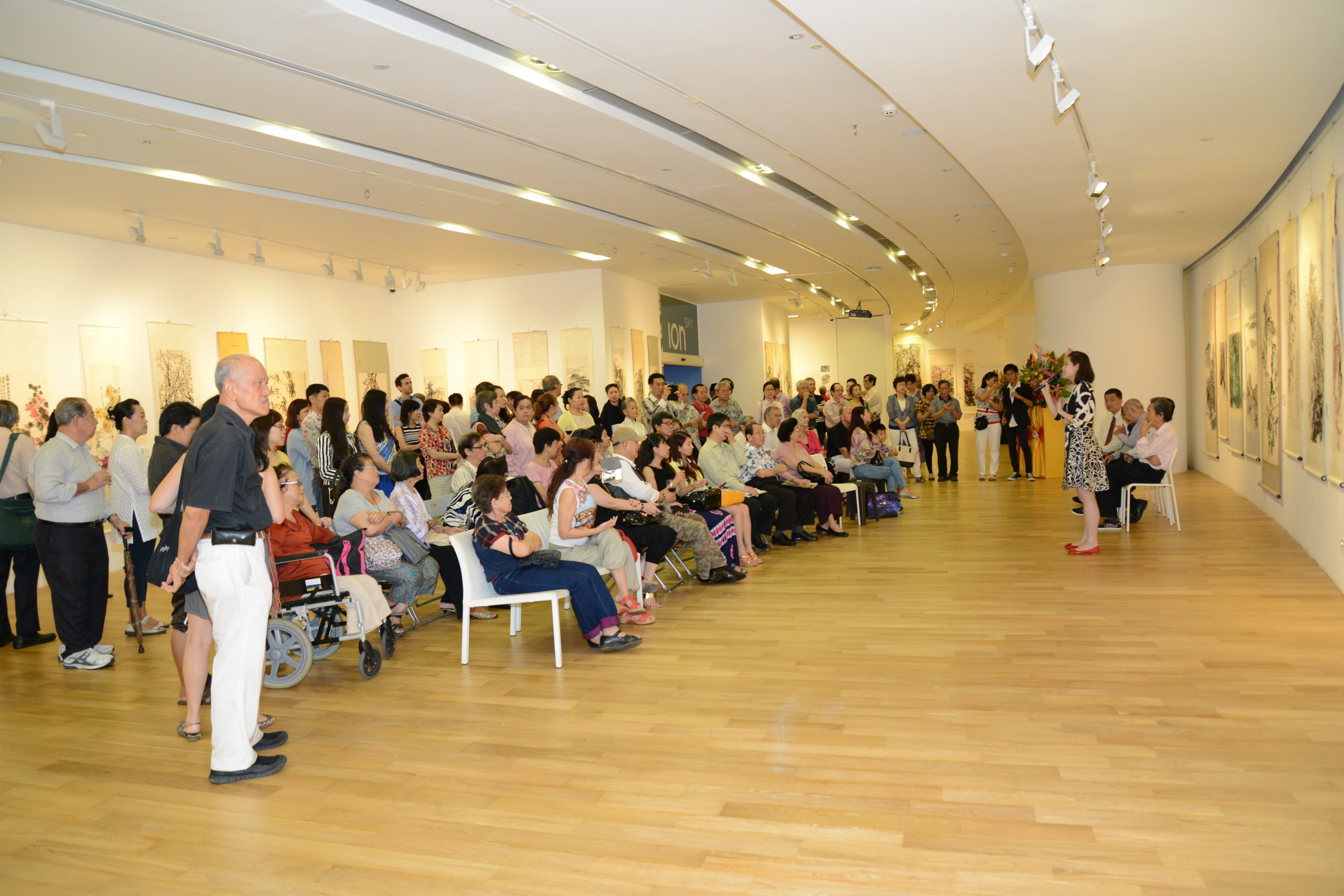 Born in 1940, Ling Cher Eng was a second-generation Singaporean artist. Ling studied Chinese painting under the pioneer artist Fan Chang Tien (1907-1987) from 1957, when he attended Chung Cheng High School. The literati tradition of the Shanghai School of painting as practised by Fan, which can be traced back to the Shanghai School masters Wang Geyi, Wang Yiting, Pan Tianshou and Zhu Wenyun deeply influenced Ling and resonated with his passion for ink painting. Ling greatly admired Fan and studied under him with determination to master the arts of verse, painting, calligraphy and seal-carving, the four attributes of the literati tradition. Ling’s dedication and perseverance led him to continue his tutelage under Fan for the next thirty years from 1957 to 1987, making him the first and longest disciple of Fan Chang Tien.
Having acquired a strong foundation from Fan’s tutelage, Ling Cher Eng’s works captured the carefree and effortless expressionism of the Shanghai School xieyi style. Ling’s oeuvre spans a wide range of subjects. Not only was he adept at classical themes of the plum blossoms, orchids, bamboo and chrysanthemum (known in Chinese as the sijunzi or ‘four gentlemen’), Ling was also creative in applying his talents to more uncommon subjects in Chinese painting, including tropical fruits and flowers, the regional landscapes of Malaysia, Thailand and Singapore, both urban and rural; nudes and portraits, and his lively depictions of snails and sparrows among other subjects. Ling especially won recognition and praise for his paintings of plum blossoms and his landscape works, noteworthily their bold composition and for his daring use of ink as an expressive force in itself.
Born in 1940, Ling Cher Eng was a second-generation Singaporean artist. Ling studied Chinese painting under the pioneer artist Fan Chang Tien (1907-1987) from 1957, when he attended Chung Cheng High School. The literati tradition of the Shanghai School of painting as practised by Fan, which can be traced back to the Shanghai School masters Wang Geyi, Wang Yiting, Pan Tianshou and Zhu Wenyun deeply influenced Ling and resonated with his passion for ink painting. Ling greatly admired Fan and studied under him with determination to master the arts of verse, painting, calligraphy and seal-carving, the four attributes of the literati tradition. Ling’s dedication and perseverance led him to continue his tutelage under Fan for the next thirty years from 1957 to 1987, making him the first and longest disciple of Fan Chang Tien.
Having acquired a strong foundation from Fan’s tutelage, Ling Cher Eng’s works captured the carefree and effortless expressionism of the Shanghai School xieyi style. Ling’s oeuvre spans a wide range of subjects. Not only was he adept at classical themes of the plum blossoms, orchids, bamboo and chrysanthemum (known in Chinese as the sijunzi or ‘four gentlemen’), Ling was also creative in applying his talents to more uncommon subjects in Chinese painting, including tropical fruits and flowers, the regional landscapes of Malaysia, Thailand and Singapore, both urban and rural; nudes and portraits, and his lively depictions of snails and sparrows among other subjects. Ling especially won recognition and praise for his paintings of plum blossoms and his landscape works, noteworthily their bold composition and for his daring use of ink as an expressive force in itself.
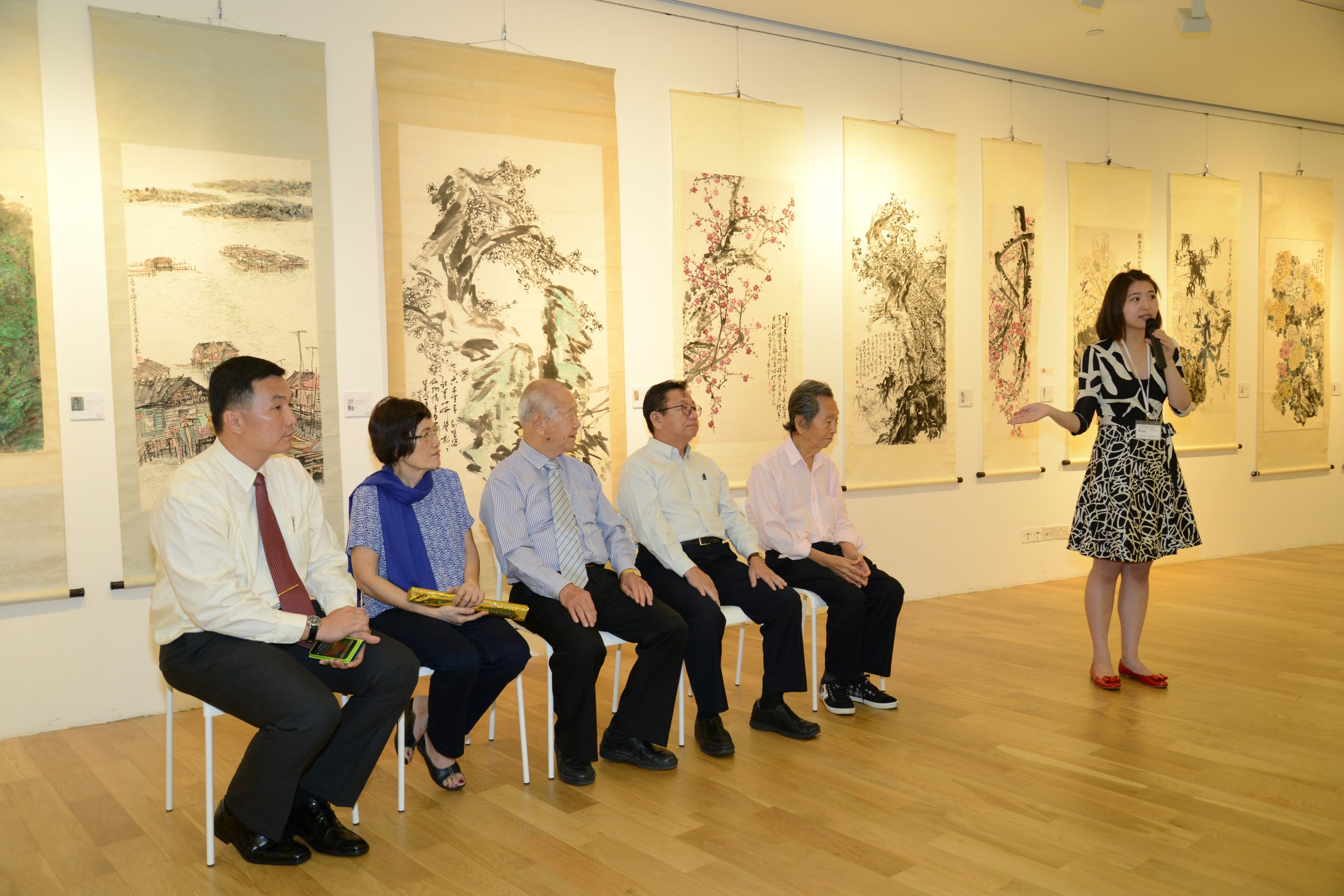 In his Southeast Asian themes, he painted sceneries of Singapore, Malay kampungs and Balinese landscapes, bringing to life these regional vignettes in his vigorous style which still preserves the finesse and detail of his subject matter. The largeness of spirit and expression typical of the Shanghai School can be seen in his classical themed paintings of birds and flowers. But Ling went beyond the traditions in which he was schooled, incorporating increasingly abstract qualities in his work. By the 1990s, his work in the landscape genre had included the usage of acrylic paints, making him stand out as a modern Chinese painter of the times.
Other than his personal achievements as an artist, Ling is also one of the founders of the Hwa Hun Art Society, serving as president and vice-president of the Society several times. He played a pivotal role for the promotion and education of Chinese ink painting in Singapore. He was the head of the department of art at the New Town Primary School for many years, where his students often scored good results in art competitions. Through all these, Ling has contributed to the teaching of art and Chinese painting in Singapore, with dedication to his profession as a teacher and an artist.
Ling Cher Eng – an ink legacy of our time – passed away of a sudden illness while on tour with his artist friends to Taiyuan, Shanxi Province in China, in 1995. Nearly 20 years on, he is very much remembered by those who knew him, and his works are still enthusiastically mentioned among ink painting circles. His works brought together the tradition of the Shanghai School with the regional characteristics of the Nanyang region and certain elements of Western art. All his efforts have ensured his place in our Singaporean art history, and we sincerely hope that through this retrospective exhibition, more people may learn about one of Singapore’s most exemplary ink painters.
In his Southeast Asian themes, he painted sceneries of Singapore, Malay kampungs and Balinese landscapes, bringing to life these regional vignettes in his vigorous style which still preserves the finesse and detail of his subject matter. The largeness of spirit and expression typical of the Shanghai School can be seen in his classical themed paintings of birds and flowers. But Ling went beyond the traditions in which he was schooled, incorporating increasingly abstract qualities in his work. By the 1990s, his work in the landscape genre had included the usage of acrylic paints, making him stand out as a modern Chinese painter of the times.
Other than his personal achievements as an artist, Ling is also one of the founders of the Hwa Hun Art Society, serving as president and vice-president of the Society several times. He played a pivotal role for the promotion and education of Chinese ink painting in Singapore. He was the head of the department of art at the New Town Primary School for many years, where his students often scored good results in art competitions. Through all these, Ling has contributed to the teaching of art and Chinese painting in Singapore, with dedication to his profession as a teacher and an artist.
Ling Cher Eng – an ink legacy of our time – passed away of a sudden illness while on tour with his artist friends to Taiyuan, Shanxi Province in China, in 1995. Nearly 20 years on, he is very much remembered by those who knew him, and his works are still enthusiastically mentioned among ink painting circles. His works brought together the tradition of the Shanghai School with the regional characteristics of the Nanyang region and certain elements of Western art. All his efforts have ensured his place in our Singaporean art history, and we sincerely hope that through this retrospective exhibition, more people may learn about one of Singapore’s most exemplary ink painters.
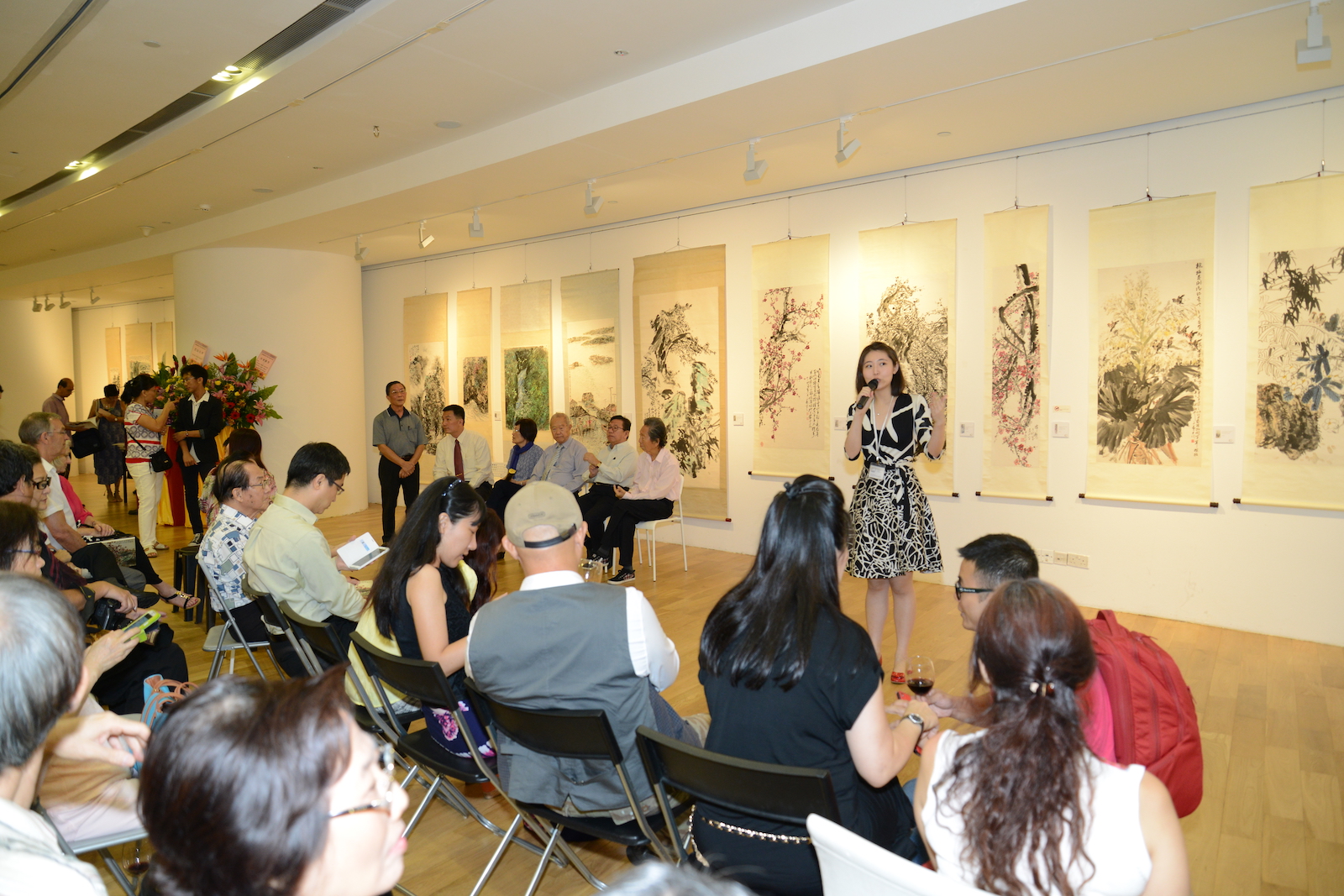
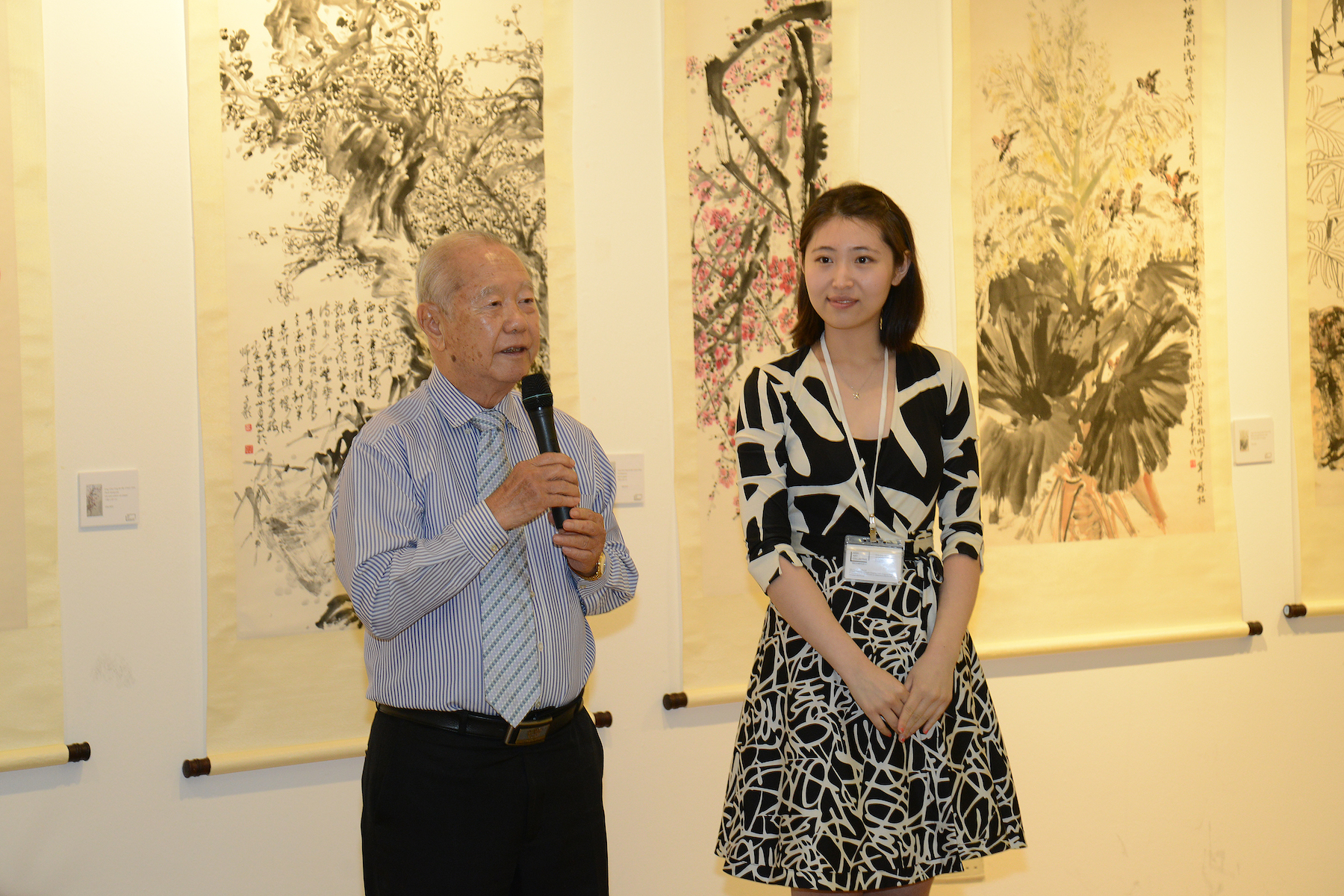
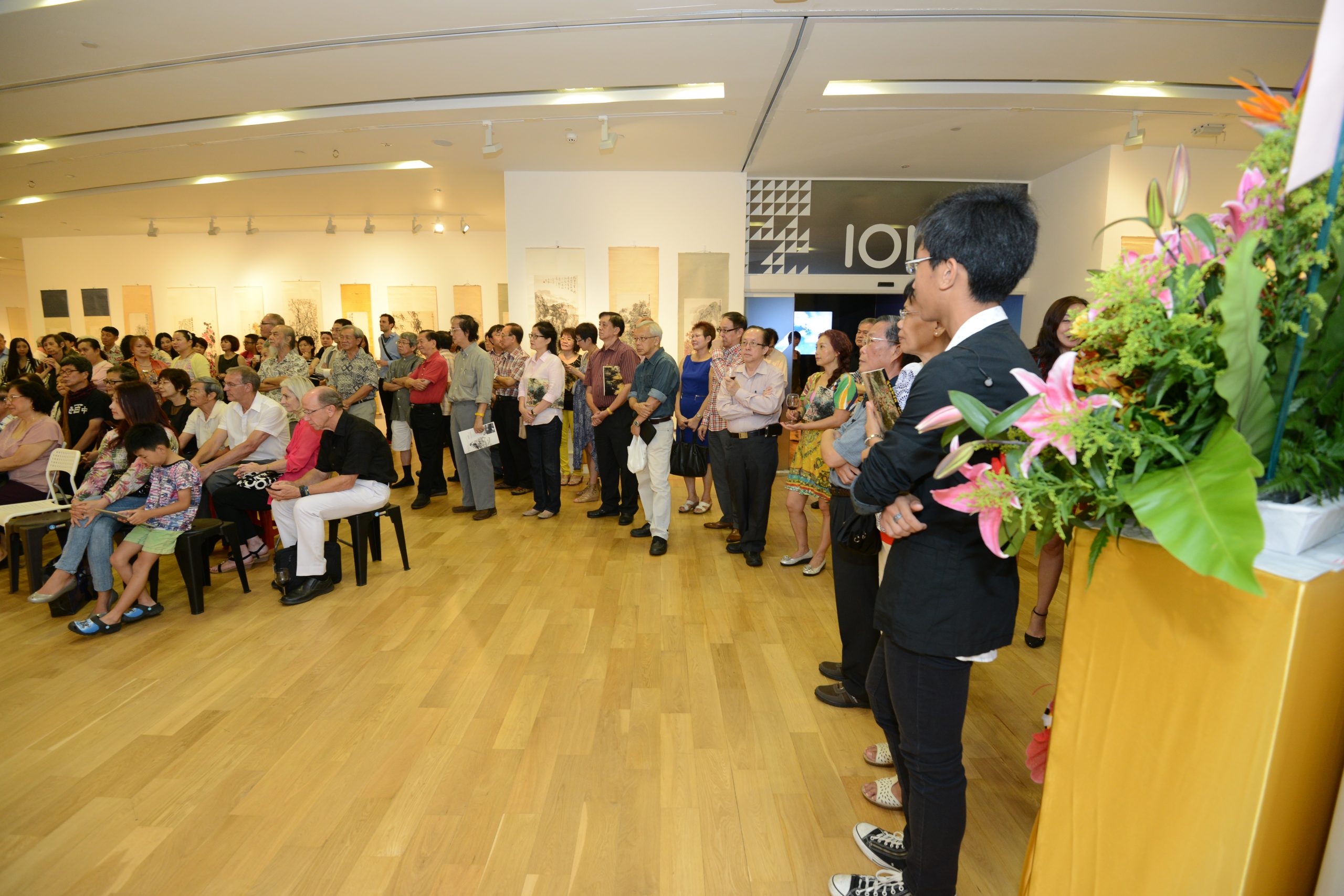
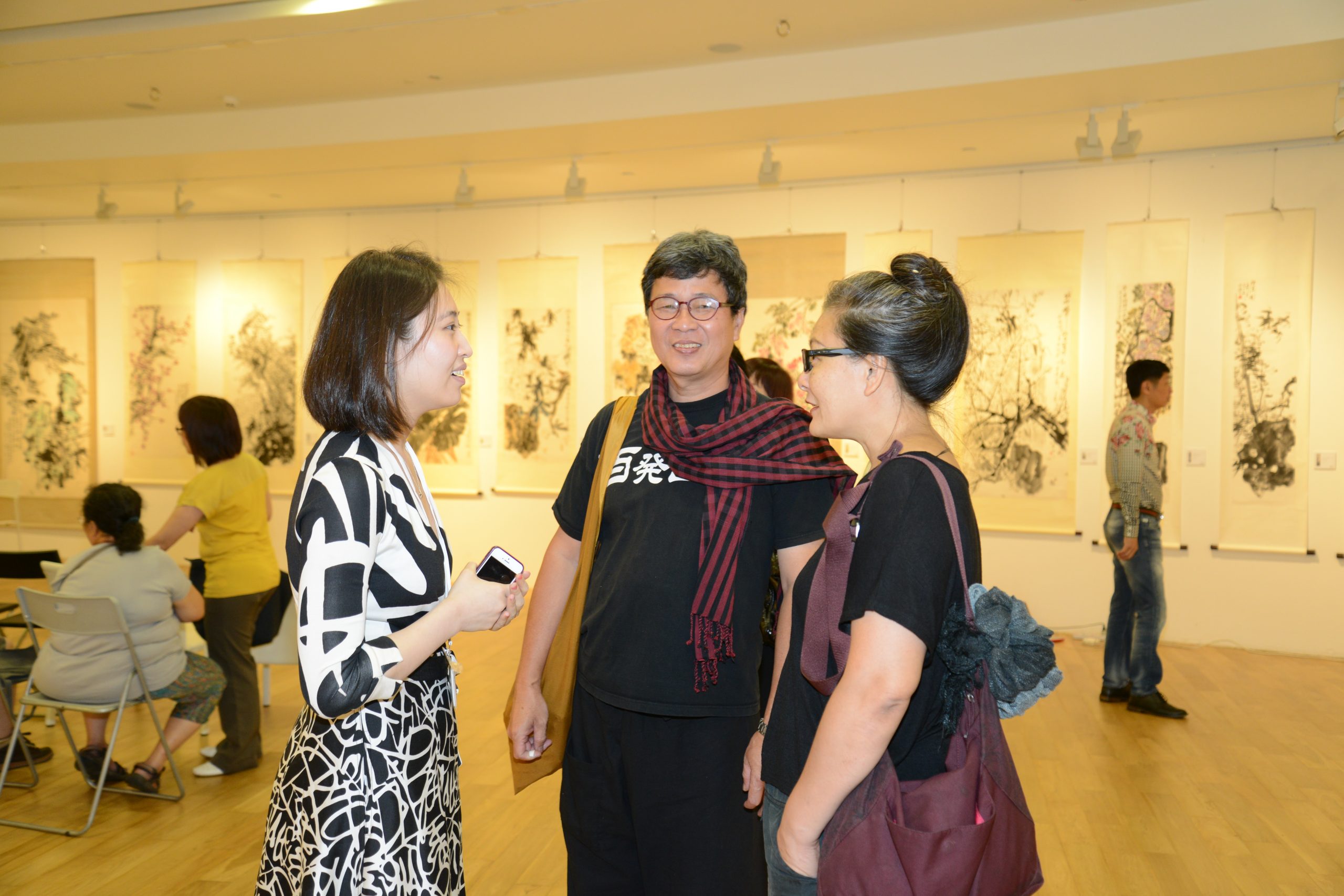
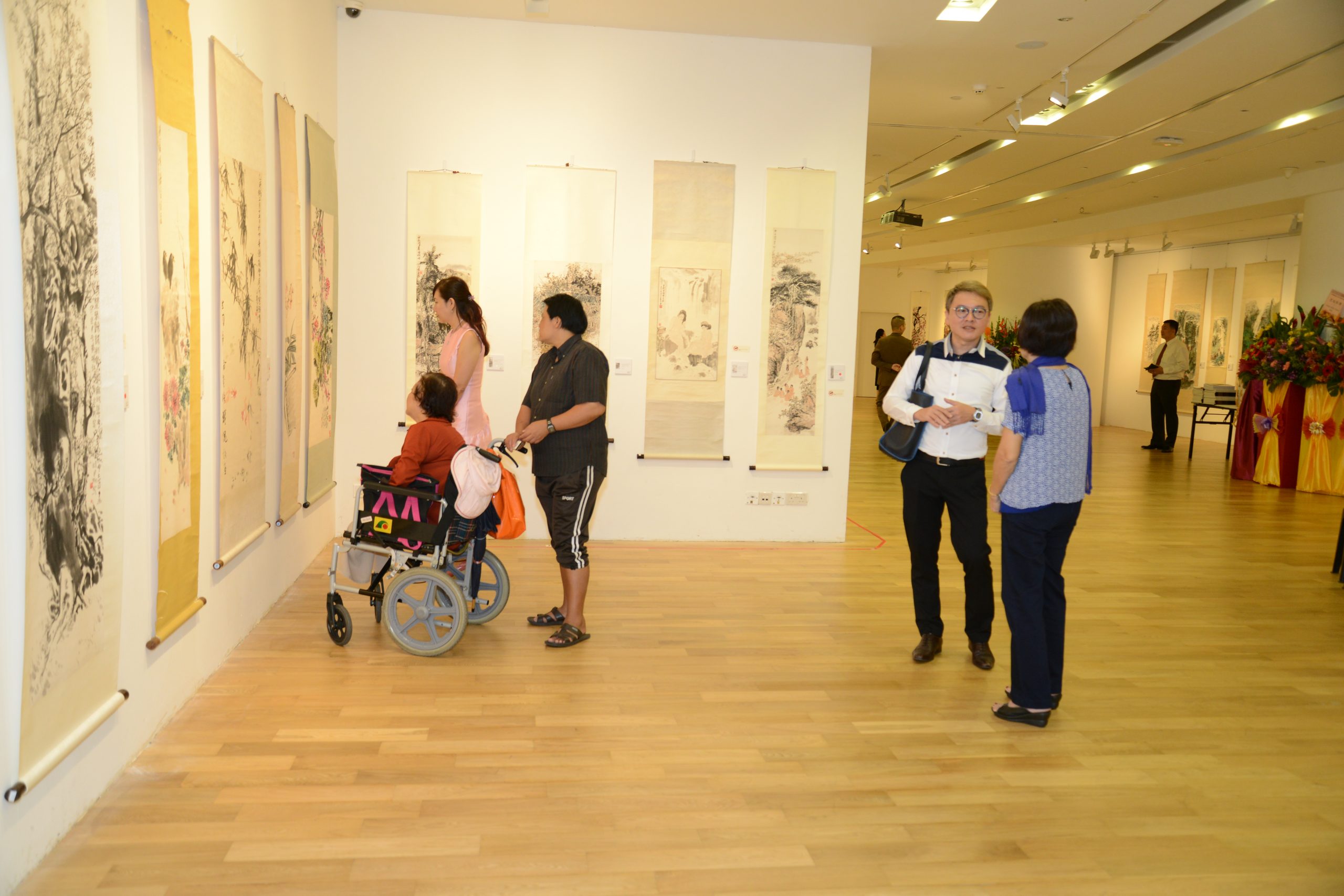
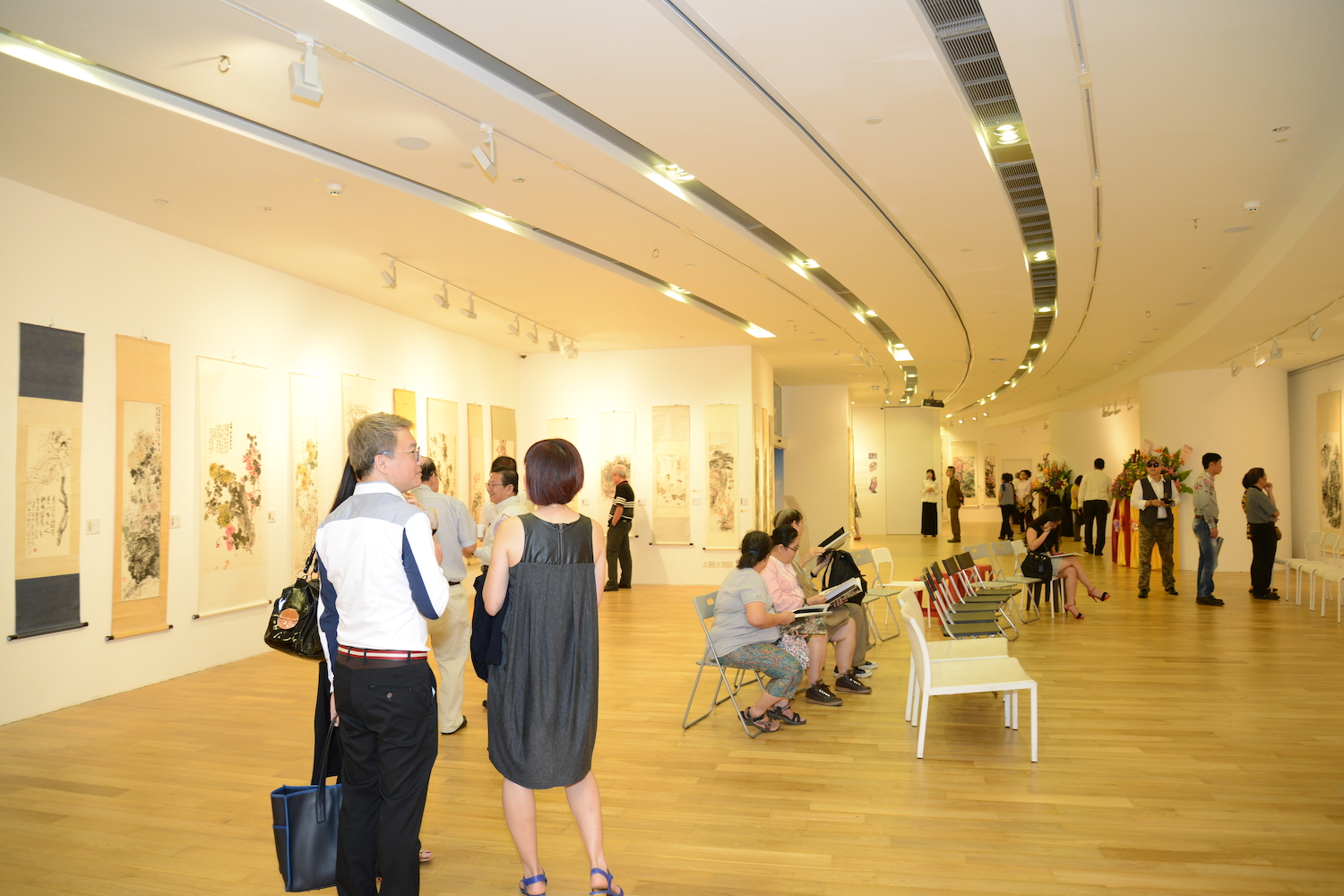
Upcoming exhibition: 1-2 November 2025

From 31 October to 2 November 2025, collectors and art enthusiasts will have an exclusive opportunity to experience Yeo Hoe Koon’s legacy at The Private Art Sale 2:
📍 Location: Artspace @ Helutrans, 39 Keppel Road, #01-05, Singapore
📅 Dates: 31 October 4pm-8pm (VIP Preview) | 1-2 November 10am-8pm (Public Viewing)
⏰ Time: 11:00am – 8:00pm daily
This highly anticipated event will present more than 100 carefully curated artworks offered at 20%–80% below current market prices, providing collectors with a rare chance to obtain meaningful pieces of Singapore’s art history while engaging deeply with the artist’s legacy.
Since its establishment in 2013, Asia Art Collective has been dedicated in promoting both local and international artists. It has organised themed exhibitions for artist, providing artwork appraisal, authentication services and actively connecting artists with suitable collectors.
For collectors, Asia Art Collective offers collection planning services, helping them evaluate and analyse artwork market prices and future trends. The goal is to help art collectors acquire artworks they truly love while also understanding their value and potential for appreciation. By positioning art as an investment and a means of asset growth, Asia Art Collective ensures that collectors benefit from their acquisitions.
In addition, Asia Art Collective oversees the buying and selling of artworks and offers bespoke art services tailored to clients in Singapore.

